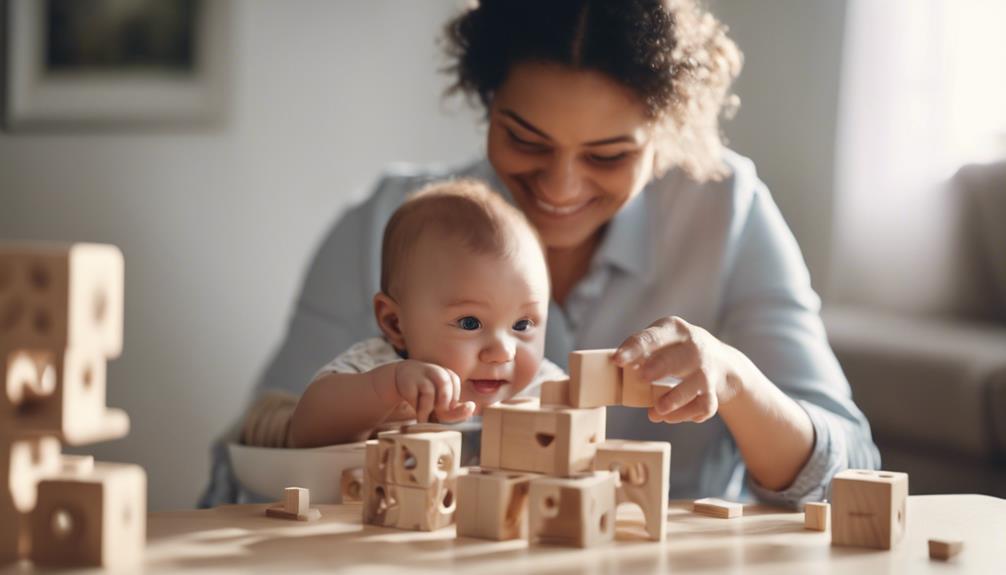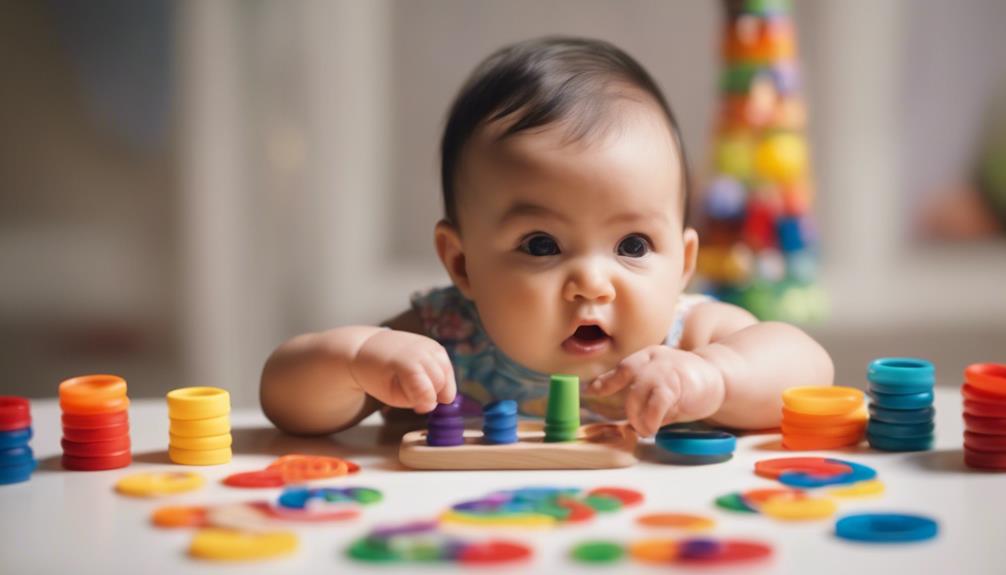To support the development of your baby’s cognitive skills, engage in interactive activities that stimulate curiosity, improve problem-solving abilities, and enhance memory. Playing hiding games to build object permanence skills can help your baby understand concepts better. Encourage critical thinking by exposing your baby to various play experiences such as stacking blocks and sorting shapes. Reading books and singing songs during everyday routines can boost language development. Allow your baby to make independent choices during interactions with you to promote decision-making skills. Create a stimulating environment with different textures and colors to aid in memory development. By focusing on these aspects, you can establish a solid foundation for your baby’s cognitive growth.
Key Takeaways
- Engage in interactive play to foster curiosity and exploration.
- Provide a variety of play experiences to enhance cognitive skills.
- Encourage problem-solving abilities through nurturing environments.
- Support memory development through interactions and experiences.
- Stimulate cognitive growth with brain-building play activities.
Early Stages of Cognitive Development
In the early stages of cognitive development, newborns begin to recognize and respond to voices, setting the groundwork for future learning and understanding. Your baby's brain is like a sponge, absorbing information from the environment.
By engaging in simple activities like playing peek-a-boo or shaking a rattle, you're fostering their understanding of cause and effect relationships. These interactions help strengthen the neural connections in their brain, paving the way for more complex learning later on.
As your baby gazes at your face or colorful toys, they're learning to notice and remember important visual cues. It's essential to observe signs of tiredness to prevent overstimulation, ensuring healthy cognitive development.
Encouraging Curiosity Through Play

Encouraging curiosity through play is essential for fostering your baby's cognitive development and exploration of the world around them. Play encourages curiosity in babies, allowing them to learn cause and effect interactions and engage in activities that stimulate their senses.
To enhance cognitive skills through play, provide a variety of play experiences to help babies build problem-solving abilities and understand their environment better. Interactive play with caregivers not only supports cognitive growth but also fosters a strong parent-child bond crucial for your baby's development.
Encouraging exploration and independent play in babies further aids their cognitive development, enhancing their understanding of the world.
- Play encourages curiosity and exploration.
- Cognitive skills are developed through various play experiences.
- Interactive play with caregivers strengthens the parent-child bond.
- Exploration and independent play support cognitive growth.
Building Object Permanence Skills

To develop your baby's object permanence skills, it's essential to understand the basics of this cognitive concept.
By engaging in developmental activities like hiding games, you can help reinforce your baby's comprehension of object permanence.
Consistency in these activities is key to nurturing your baby's cognitive growth and problem-solving abilities.
Object Permanence Basics
Building object permanence skills in babies typically starts around 4 months of age. During this significant stage of cognitive development, babies begin to grasp the concept that objects continue to exist even when they're out of sight.
To help babies learn about object permanence, playing hiding games with objects or people can be beneficial. Additionally, observing consistent reactions from objects aids in babies' understanding of object permanence.
This understanding is fundamental for babies' cognitive development and learning, laying the groundwork for more complex cognitive processes in the future.
By engaging in play activities that involve hiding and revealing objects, babies gradually develop their understanding of object permanence, which is essential for their overall cognitive growth.
Through these simple yet effective activities, babies can enhance their cognitive abilities and build a solid foundation for future learning and development.
Developmental Activities Recommended
Engage in interactive play sessions to foster object permanence skills in babies around 4 months of age. Playing hiding games with your infant can greatly contribute to their understanding of object permanence. At this developmental stage, babies begin to realize that objects continue to exist even when they're out of sight. This understanding is vital for their cognitive development.
By observing people and objects around them, infants gradually grasp the concept of object permanence.
During playtime, try hiding a toy under a blanket and then revealing it to your baby. This simple activity helps reinforce the idea that objects still exist even when they can't be seen. Encouraging your little one to search for hidden items can enhance their cognitive abilities and build their object permanence skills.
Importance of Consistency
Creating a consistent environment is essential to nurturing your baby's object permanence skills and cognitive development. Consistency in interactions and experiences plays an important role in helping your baby understand that objects exist even when hidden from view.
Engaging in activities like playing peek-a-boo can assist in your baby's grasp of object permanence. By 8-12 months, you may notice your baby actively searching for hidden objects or people, showcasing a growing awareness of object permanence.
Playing hiding games with toys or caregivers further supports your baby in learning about object permanence and developing important cognitive skills. Understanding object permanence is a significant milestone in your baby's cognitive development, laying the groundwork for enhanced problem-solving abilities and memory retention.
Developing Problem-Solving Abilities

To enhance your baby's cognitive development, focus on nurturing their problem-solving abilities through interactive play and exploration. Cognitive development in infants is intricately linked to the development of problem-solving skills.
By encouraging your baby to explore new objects, apply their learning to different situations, and engage in critical thinking, you can support the growth of their problem-solving abilities. Motivating your baby to explore and learn fosters their problem-solving skills, helping them navigate challenges and find solutions effectively.
Creating a nurturing environment that models problem-solving behaviors also plays an essential role in building your baby's problem-solving skills. Critical thinking and problem-solving are essential components of cognitive development for infants aged 8 to 12 months.
Engaging in brain-building play activities with your baby can further enhance their problem-solving abilities and contribute to their overall cognitive development. By actively participating in these activities, you're laying a strong foundation for your baby's cognitive growth and problem-solving capabilities.
Engaging in Everyday Teachable Moments

You can create daily learning opportunities for your baby by engaging in interactive playtime ideas. These simple activities like naming objects, making eye contact, and responding to your baby's cues can lay the foundation for cognitive development.
Daily Learning Opportunities
Engage in everyday teachable moments to enhance your baby's cognitive development through simple interactions during daily activities. By incorporating these practices, you can positively impact your baby's learning experience:
- Encourage Exploration: Allow your baby to explore their surroundings through supervised play, fostering curiosity and problem-solving abilities.
- Language Development: Talk, sing, and narrate activities to help your baby develop language and communication skills.
- Daily Routines: Engaging in daily routines with your baby builds familiarity, routine recognition, and a sense of security.
- Different Play Activities: Provide a variety of play activities to stimulate different areas of cognitive development by giving opportunities for learning colors, shapes, and objects in the environment.
Interactive Playtime Ideas
During interactive playtime, incorporating simple games and activities provides valuable opportunities to enhance your baby's cognitive development. Engaging in interactive play ideas not only entertains your baby but also helps in encouraging exploration and stimulating cognitive development. By giving your baby the chance to participate in play activities like stacking blocks, sorting shapes, and solving simple puzzles, you are creating an environment that fosters learning and growth. Additionally, incorporating language-rich activities such as reading books, describing daily routines, and asking open-ended questions during playtime can significantly contribute to your baby's language and cognitive growth.
| Interactive Play Ideas | Benefits | Examples |
|---|---|---|
| Stacking Blocks | Enhances problem-solving skills | Building towers |
| Sorting Shapes | Develops cognitive abilities | Matching shapes |
| Reading Books | Promotes language development | Pointing to pictures |
| Simple Puzzles | Improves critical thinking | Putting pieces together |
Parent-Child Activities for Cognitive Growth

Participating in parent-child activities such as reading books, singing songs, and playing with toys is instrumental in fostering cognitive growth in babies. These activities create a strong foundation for your baby's cognitive development through interactive engagement and learning experiences.
Here are some good play ideas to enhance cognitive growth with your baby:
- Make Learning Fun: Engage in educational games that make learning enjoyable for your baby.
- Give Attention: Provide focused attention during playtime to stimulate your baby's cognitive skills effectively.
- Encourage Exploration: Allow your baby to explore different textures, colors, and shapes through play activities.
- Support Independent Choices: Encourage your baby to make independent play choices to promote decision-making skills and cognitive development.
Supporting Memory Development

To support memory development in babies, it's essential to create a stimulating environment that encourages exploration and interaction. By promoting cognitive development through nurturing environments, you can lay the foundation for strong memory skills in infants. Understanding object permanence, which typically develops around 4 months, is vital as it helps babies realize that objects exist even when out of sight.
Memory and understanding in babies are nurtured through interactions, experiences, and exposure to various stimuli. Encouraging exploration, play, and repetition can greatly help babies develop memory skills and comprehend the permanence of objects. Responding to babies' interests, celebrating their discoveries, and providing a supportive environment are key strategies for supporting memory development.
Frequently Asked Questions
How to Encourage Cognitive Development in Infants?
To encourage cognitive development in infants, engage in interactive play, offer various toys, and involve parents in activities. Create sensory experiences with soft toys and colorful visuals. Provide a safe environment for exploration and learning.
How Does Talking to Your Baby Help Cognitive Development?
Talking to your baby helps cognitive development by exposing them to language sounds, patterns, and vocabulary. Regular interactions with caregivers enhance communication skills and stimulate brain development. Engaging in conversations supports language acquisition and early learning.
What Are Examples of Cognitive Development in Infants?
Recognizing familiar faces, responding to their name, and exploring cause and effect relationships are essential for cognitive development in infants. Around 4 months, understanding object permanence begins. Categorizing objects, noticing differences, and sensory exploration are also key.
What Is Cognitive Thinking in Early Childhood?
In early childhood, cognitive thinking involves processing information, problem-solving, decision-making, and understanding the world. Memory, attention, language, reasoning, and perception skills develop rapidly. This lays the foundation for future learning, success, and interactions.
Conclusion
So, as you start on the journey of encouraging your baby's cognitive development, remember to keep things fun and engaging.
Through play, exploration, and everyday interactions, you can help your little one grow and learn in amazing ways.
Just like planting seeds in a garden, nurturing your baby's mind will lead to a blossoming of knowledge and skills.
So, enjoy this special time of discovery and watch as your baby's mind blooms with potential.










